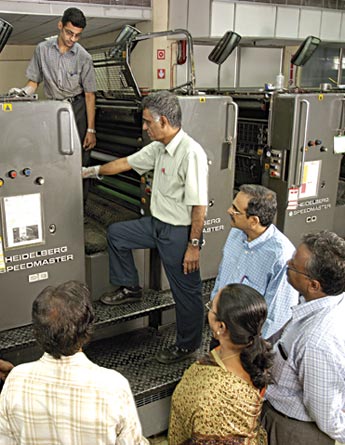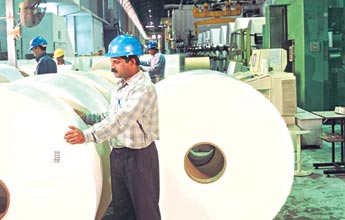|
As on March 31, 2005, ITC employed 15,692 (13,850 in 03-04) persons in the units
covered in the scope of this report. Out of these, 10,605 employees belonged to the
unionised cadre. The remaining were Management Staff, Lady Confidential Secretaries,
Administrative Assistants and those non-management staff who have opted ‘out of union
membership’. All unionised ‘non management staff’ at the factories, hotels
and other establishments are represented by independent trade union organisations with
whom periodic Long Term Agreements (LTAs) are signed. All Management Staff, Lady
Confidential Secretaries and Administrative Assistants who are not unionised, enter the
services of the organisation by signing individual contracts of employment.

The total number of employees in the current report exceeds the number stated in the
previous report by 1,842. The merger of ITC Hotels with ITC Ltd. and the acquisition of
the Kovai Paper Mill brought 1,752 employees into the fold of the Company. ITC created
direct additional employment opportunities for 304 persons in the newly opened Grand
Central Sheraton Hotel in Mumbai. |
 |
|
Labour/Management Relations |
Information and Consultation on Changes
ITC believes in an employee-engagement process that aligns its employees with a shared
vision and purpose, because every individual brings a different perspective and capability
to the team. ITC thus harnesses the creative potential of all its employees by promoting a
culture of partnership to unleash relevant synergies between different groups of
employees.

All major changes in operations involving work processes, manning norms and other
productivity linked issues are carried out after discussions and consultations with the
employees and the recognised unions at each location.
Business plans are shared with employees at all units, through a series of formal
communication meetings and intranet portals. Unionised employees at the concerned units
are informed of all major changes well in advance, through their representatives.
The responsibility for the implementation of the policy rests with the Unit’s HR
Department in the case of unionised employees, and with the concerned DMCs for other
employees.
The employees are given enough time to consider the implications of change,
consult/notify their union, seek the union’s opinion and notify the management.
The Policy is actualised through consultative meetings with the representatives of
workers, culminating in joint minutes/agreements.
Compliance with the Policy is regularly monitored by the Unit Head. |